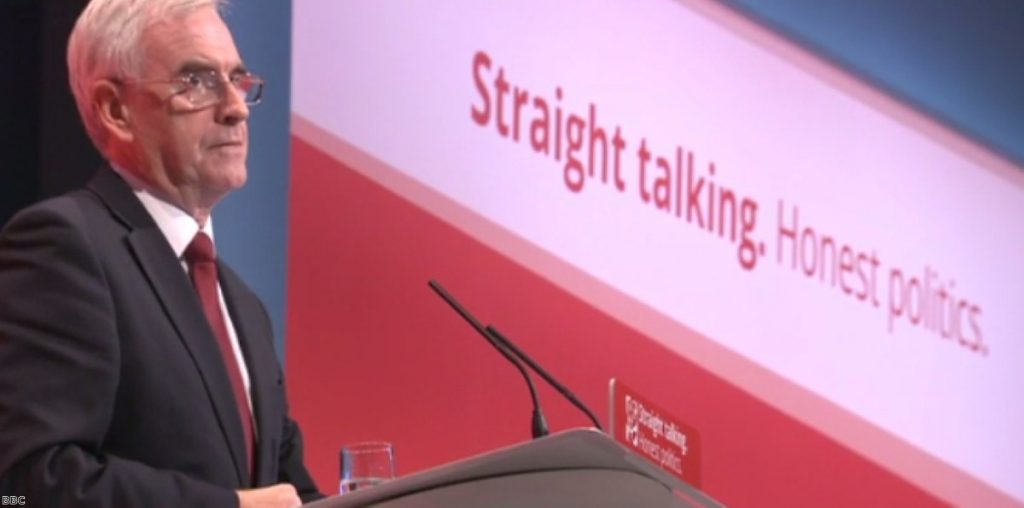John McDonnell’s ‘straight-talking’ will only take Labour so far
"I warn you this is not my usual rant, they get me into trouble and I've promised Jeremy to behave myself," said John McDonnell today in his first major speech as shadow chancellor
True to his word, it was a far better-behaved McDonnell that appeared before the Labour conference this morning. Gone was the bombastic left-wing rabble-rouser seen at so many of Corbyn's campaign rallies. In its place was a calmer and more consensual approach.
He urged those on the right of the party who had refused to serve in the shadow Cabinet to "come back and help us succeed," while seeking to reassure the public that a Labour government would "live within its means".
But while the style was different, the message was essentially the same.


Right at the start of the speech he dismissed calls to take a more centrist economic approach.
"Here's some straight talking," he said referencing the party's new slogan.
"At the heart of Jeremy’s campaign, upon which he received such a huge mandate, was the rejection of austerity politics." There was going to be no reversal on that key pledge.
McDonnell had already set out plans to match the Tory pledge to balance the current account deficit. However, McDonnell today pledged that he would do this without any cuts to the public sector whatsoever.
He insisted that Labour’s plans to balance the books would be "aggressive," but insisted that "our cuts will not be the number of police officers on our streets or nurses in our hospitals or teachers in our classroom."
The burden for tackling the deficit would instead fall on "corporate welfare" and tax breaks for corporations, he insisted. He added that "Starbucks, Vodafone, Amazon and Google and all the others" would be forced to pay "their fair share of taxes".
Recent press attacks on McDonnell for previously supporting direct action by protesters did not appear to have rattled him. "Austerity is not a necessity, it is a political choice," he said today, in words which mimic almost exactly those of groups like UK Uncut.
He also refused to back away from his pledge to print more money to pay for infrastructure, despite widespread criticism both inside and outside the party.
"We'll use active monetary policy to stimulate demand where necessary," he insisted.

McDonnell and Corbyn: Brothers in arms
In many ways, McDonnell's stance should come as little surprise. Corbyn has just won a huge mandate on a strictly anti-austerity ticket. If McDonnell had come out with anything other than a staunchly anti-austerity message it would rightly be seen as a betrayal of that support.
Yet there are signs that those around Corbyn are beginning to understand the scale of the task they face in order to change public perceptions of his leadership and the wider party.
"You know the narrative George Osborne wanted to present of us this week," McDonnell said.
"Deficit deniers risking the security of the nation etc. It was so obvious you could write it yourself blindfolded."
But just because something is obvious does not mean it is ineffective. Recent polls suggest that the Tories' central message that Corbyn and McDonnell are threats to the country's economic and national security is getting through to the public.
The difficulty for Labour is that unless they deal with that perception, it will only grow. The Tories won the last general election on the simple message that voters should stick with nurse, in fear of something worse. If that message was effective even against a sanguine and inoffensive man like Ed Miliband, then it is likely to be even more effective against somebody with the views, associations and records of McDonnell and Corbyn.
Labour's new anti-austerity message will also only take them so far. During his speech today, McDonnell urged SNP voters to "come home" to "the only anti-austerity party" in the UK.
Yet while the SNP did win partly by painting Labour as "red Tories" they also won through convincing voters from across the political spectrum that they could be trusted to best represent Scotland's interest. And once you look beyond the spin and their policies on things like Trident, the SNP's pro-business, pro public-services agenda, most closely resembles that of Labour under Tony Blair.
There is a reasonable chance that Labour can win the argument on austerity. As the economy grows, Tory plans to stick rigidly to public sector cuts, while cutting taxes for high-earners and corporations, may start to turn public opinion against them.
But even if Labour can win the economic battle, it doesn't mean they will win the electoral one. In order to win in 2020, voters need to be convinced not only of Labour's economic policies, but far more importantly, they need to believe that Labour's leadership can be trusted to deliver them.
John McDonnell today began his fight to win the first battle. Victory in his second battle still looks incredibly difficult to achieve.









